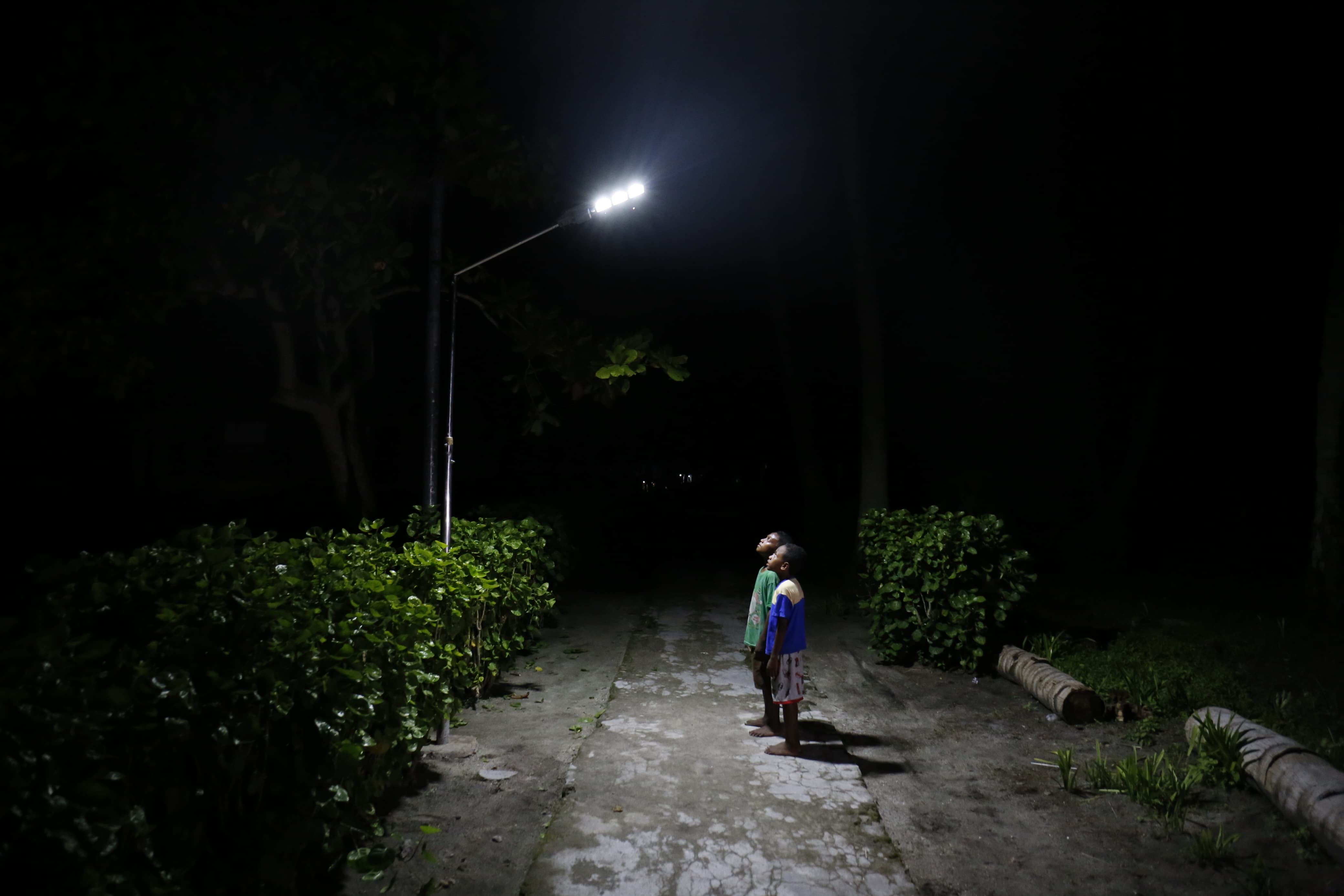Lighting the Way: MoSA's Solar Power Initiative Transforms Lives on the Mapia Islands

MAPIA ISLANDS (19 September 2023) -- The night falls at 7.30 p.m. Eastern Indonesia Time but life continues to buzz on the Mapia Islands, the outermost island of Indonesia. The laughter of children playing echoes through the air, calling each other's names to catch the tossed ball. Not long after, a middle-aged woman came, telling her child to come home immediately.
Children and parents walked up and down the 1.5-meter walkway. On several sides of the road, you can see Solar Powered Public Street Lighting (PJUTS) lamps lined up as a source of lighting. These lights were only installed by the Ministry of Social Affairs (MoSA) two weeks ago.
There are nine units installed on Brasi Island, which serves as the Mapia Islands' administrative headquarters. On Pegun Island, another unit was installed.
"It's been dark all this time. I am thankful for MoSA's assistance," said Paulina Aruan (33), a Mapia Islands inhabitant.
According to her, lighting is really needed, and she is relieved that her home is no longer dark at night. How could it not be? Her home is now equipped with a Solar Home System (SHS) from MoSA.
"I use it to charge my phone and sometimes at night for lighting when cooking," Paulina explained.
SHS is a self-contained solar power plant (PLTS) that provides electrical energy to household appliances such as lights, TVs, radios, and other electronic devices. MoSA distributed 82 SHS units to every house and agency on the Mapia Islands.
Last year, the residents of the Mapia Islands lived in darkness during the nighttime hours. The primary source of lighting, the solar power plant (PLTS), had suffered damage, leaving the islands without a reliable electricity source.
Located in the vast expanse of the Pacific Ocean, these islands are isolated, with the closest mainland city, Manokwari City, being a daunting 290 km away. Inhabitants relied on occasional visits to the Outer Island Security Task Force's post to charge their cell phones, and for those fortunate enough, generator usage was an option. However, many had to resort to kerosene lanterns.
When kerosene supplies ran low, life became even more challenging. Ships carrying fuel and other necessities dock only twice a month, and only if the weather permits. Ships may be unable to dock for months due to poor weather. As a result, the presence of SHS from MoSA was welcomed with joy.
Widiana Lestiarini (56) was another resident who benefited from the SHS, much like Paulina. This Mama Jawa is overjoyed because she can sleep with the light on. Her grandchildren can also study in peace.
"This one can power the phone and lighting at home. We are very fortunate that the children can now study with ease, unlike yesterday," she remarked.
According to her, the SHS provided by the MoSA is quite simple to use. "It's not too difficult for housewives. For instance, if our husbands are not around, we can do it ourselves," she explained.
Mama Widi also shared her experience regarding using SHS. She described how she set up the solar panels or solar modules to capture sunlight during the day. As dusk approached, she connected the charged battery to the LED bulb. If it is sunny all day, she and her family can enjoy lighting all night and charge their phones.
"Thank God, the SHS at my house can provide lighting till morning," said this Javanese woman who has lived in Mapia for 16 years.
Apart from SHS, Mama Widi also feels safer leaving the house at night thanks to the MoSA’s PJUTS. Previously, when she went out at night, she had to rely on a flashlight or moonlight. Lack of lighting also hinders her work in processing copra (dried white flesh of the coconut) at night.
"Now, we won't be afraid to go out at night. We feel at ease walking alone and are not afraid of anything. Thank you very much, minister. We had a great time with the lights," she remarked.
The Mapia Islands are an archipelago neighboring Palau and the Philippines, located in the northern region of Papua. The Mapia Islands consist of three islands, namely Brasi Island, Pegun Island and Fanildo Island. Only two islands are inhabited by a total of 79 families. Meanwhile, Fanildo Island is left without residents to maintain the sustainability of the habitat for
animals such as turtles.
The islands face numerous challenges, including access to clean water, transportation, and essential supplies. The recent Mapia Islands National Expedition, a collaborative effort between MoSA and the Indonesian Navy on 12 September 2023, brought critical aid to the residents. This included clean water, household equipment, laying hens, health support, education, and other assistance to the residents of the Mapia Islands in West Supiori District, Supiori Regency, Papua.
 English
English
 Bahasa
Bahasa
